Sustainability continues to climb the agenda for many businesses, however an alarming number are failing to place it at the core of their operations, and are confusing CSR with ESG, according to Single Organizing Idea founder, Neil Gaught.
Most businesses are familiar with the term CSR and probably have a number of initiatives in place which purport to deliver tangible benefits to the environment or society. What is far less common, at least in the UK, is the term ESG (Environmental, Social and Governance).
Neil Gaught, founder of Single Organizing Idea and bestselling author (CORE, CORE - The Playbook) believes that these three letters will fundamentally shape the future of every business on the planet, but are frequently misunderstood.
Neil is concerned that for many businesses, the current approach to ESG and sustainability isn’t that much different to their approach to CSR. “It’s about compliance and doing enough to tick the boxes required to ensure they can continue to operate,” says Neil.
But that approach is like trying to fit a square peg into a round hole, he argues. ESG is not the same as CSR although the two are inextricably linked. ‘Whilst CSR is underpinned by accountability, ESG has its foundations in measurability. CSR sets the intention, ESG ensures that these intentions are not only achieved, but critically, they are measured, assessed and evaluated,’ explains Neil.
Having personally witnessed a real sea change in the past 6 months, Neil has seen an energy and urgency around sustainability, and it’s escalating at pace. This is leading many organisations to face an inevitable crossroad; they can either ‘bolt-on’ ESG and hope they’ve done enough — or can keep on doing enough — to tick the compliance boxes and placate their stakeholders. Or, they can put sustainability at the very core of the business strategy and make it the North Star it needs to follow.
‘Putting sustainability at the core of the business in the form of a SINGLE ORGANIZING IDEA (SOI) means that leaders are immediately able to determine and plan how the business should be organised for the future and what the business should start, stop and keep doing across all its functions: people and culture, sales and marketing, processes and systems, design, innovation, procurement and communication.
Time is running out for even the most hardened climate change skeptics, new rules and regulations will inevitably mean that businesses will soon have no option but to make changes. The industry will demand it, their staff will demand it, and so too will their customers,’ adds Neil.
It’s not all doom and gloom though. The good news is that embedding ESG at the core of a business is far easier than many people think. In fact, the biggest obstacle Neil has come across over the past 15 years is simply a fear of the unknown; how long will this take, how much will it cost and how painful will the process be?
Neil explains; ‘Coming from a military background, I liken the hesitation of business to a particular high ropes exercise that we used to do that tested our courage. A version of it features on the Channel 4 programme “SAS: Who Dares Wins”. You’re asked to jump from one slippy ledge to another. Because the ledge you are jumping to is lower and slightly out of alignment with the upper ledge you are jumping from, the gap seems much wider than it actually is. It’s an illusion. It still takes courage to jump and you must overcome your fear to do it. But once you have you immediately ask yourself what all the doubt and fuss was about. “If I knew it would have been that easy I would have jumped months ago.’
Businesses looking to embark on their first step towards creating their own Single Organizing Idea are invited to complete the free SOI Confidence Scorecard.
Publish your content with EB Publishing
It's about who you reach. Get your news, events, jobs and thought leadership seen by those who matter to you.











